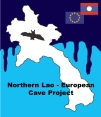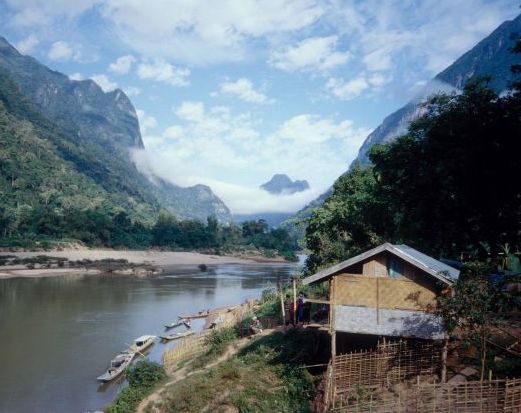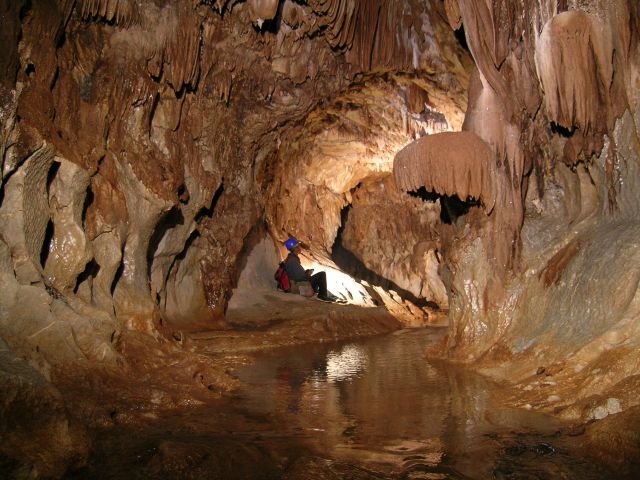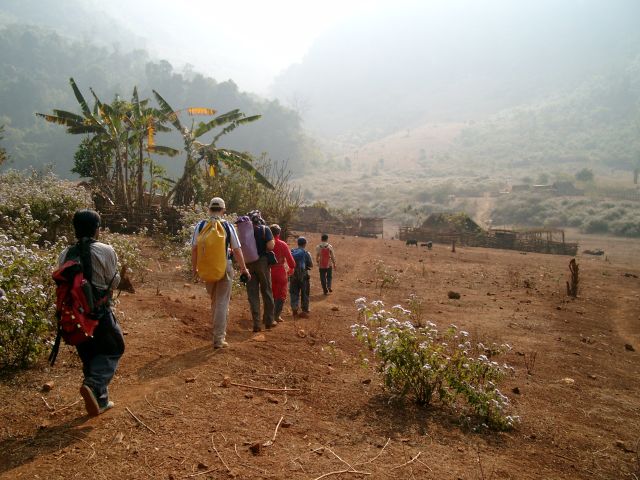



    |
Northern Lao - European |
|
|
History of expeditions in Laos:
Since 1992 Laos has rapidly opened to foreign tourists and many successful speleological projects have been carried out, mainly by French teams. On an occasional basis Italian and British caving expeditions have contributed to the knowledge on karst and caves of Laos (Brouquisse et al. 1999). Most of the caving expeditions were dedicated to Khammouane province (Mouret (2001) in central Laos and the area around Vang Vieng (Vientiane province) (Hédouin & Renouard 2000) Although caves were known from the north of Laos (e.g. the historical Pak Ou show cave near to Luang Prabang) no systematic cave exploration had been done there before a Dutch team started work in the Luang Prabang province in 2000. They surveyed 7.3 km of passages in 16 caves in the Nam Ou Valley and around Muang Nan and released a report on their findings (Eskes & Damen 2004). The Dutch trip was followed by a lightweight German reconnaissance project to the Nam Ou area around Muang Ngoy in 2002/03 and a larger German project in 2003/04 to Luang Prabang district. This yielded 34 caves with a total of 5.6 km, amongst which was, so far, the longest known cave of northern Laos (Tham Loum at 1.6 km). Finally, a common German-Dutch expedition to northern Laos was conducted in February 2005. The first part of the project focused on caves at Phou Khoun close to Kasi. The expedition succeeded to connect three separate known caves to one 2.6 km long system (Tham Nam Lot-Seua). However, the main part of the expedition was dedicated to an until then untouched area at Vieng Phouka (Luang Nam Tha province) close to the Burma and Thai border. Here a European Community based micro-project that promotes eco-tourism as an additional local income actively supported the exploration of the caves with local transport and guides. The area surprised with long active river caves. It took only a week to survey caves with a total length of 8.9 km. The longest the Tham Nam Eng system consists of an upper 3.1 km long fossil cave and a 3.3 km long lower active river cave. A link could not be found. The expedition in February 2006 focused again on the Vieng Phouka area and visited caves located in villages further away. Several water caves and higher fossil caves were surveyed, but none close to the length of Tham Nam Eng. The Tham Pasat was successfully extended into a 3 level 2.6 km system with upper passages connecting to the lower river level by shafts. The most promising area of Vieng Xai close to the Vietnam border was targeted in 2007. An beautiful karst area revealed trough river caves that cross several mountain ridges. The river cave Nam Long is 4.9 km long and possesses an complex maze of beautiful decorated side passages. Additionally the permission was obtained to survey the historic significant Pathet Lao caves that served as secret hiding places of the communist during the Vietnam and civil war. A brief visit to Vieng Thong in the same province was done on the way back to Luang Prabang confirming the potential for more caves. The 2008 expedition returned to Vieng Xai area. The area was systematical investigated and several fossil caves surveyed. This caves form a higher level above the river caves. The expedition was accompanied this time by ARTE TV. An 43 minutes documentary that interlinks the history as war caves with the current expedition was filmed and broadcasted in September 2008. The Vieng Thong area was revisited in 2009 and caves checked along the road to Vietnam. The biggest surprise was the ChomOng system in Oudomxay province. We remembered an article with cave pictures in the Lao Aviation inflight magazine about the area. The webpage of Oudomxay province invited to visit the cave. We needed 4 full days to survey 13.6 km of beautiful large cave passage. The system is now the longest cave of Northern Laos. The expedition in 2010 returned to Oudomxay and pushed the Chom Ong system to 15.7 km length. It was still going and the villages continue to report other cave entrances in the ridges surrounding the village. The Na Thong river cave of 4.4. km length and the Mokfek cave of 1.6 km length were surveyed just 15 and 30 km north of Chomg Ong. The expedition divided into two sub-teams and visited other districts of the province. Several smaller caves in Pakbeng district as well as the solcalled "trekking caves" in La district were visited and documented. The potential for caves in these areas seems to be limited. Some caves in Pak Beng were located at an unusual high altitude of 1500 m. The project continued the survey of Chom Ong. A pitch was descended and a missed middle level found. The cave has now a final length of 17.150 m. The 2nd half of the expedition was spent in the proven "start with old - look for new" tactic in a not yet visited province. The village Ban Keo 40 km south of Sayabouli hosts an ecotourism project with caves around. Within only 5 days about 8.5 km of new passages were mapped. Furthermore, several new karst resurgences and sinkholes were visited, providing good additional potential for another expedition.
To
our big surprise the Lao authorities refused permit for a return trip in
2012.
Consequently, the expedition plan had to be changed only three weeks before
the setoff and two expeditions to other provinces were quickly
established. One team explored areas in the Luang Nam Tha and Luang Prabang provinces
while the second team visited Houaphan province in the extreme
north-east of Laos. The
“western team” spent its first week in Vieng Phouka district (Luang Nam
Tha province). The area north of the town was checked during a two days
jungle trek and several new river caves 200-300 m in length were
surveyed.
The team’s
base camp for the second week was taken in Nong Khiaw
district (Luang Prabang province). Instantly, a cave on top of a long
known resurgence cave, which has already been mapped by the Project in
2002, was shown to the team. Tham Doun Mai, as this cave is called, has
a beautiful upper fossil level and an active river level which can be
accessed by a descent of 20 m. Three days of surveying yielded over 2,1
km of passage just separated from the 770 m long resurgence cave by a
sump approximately 60 m in length.
The “eastern team” targeted Houaphan province in the extreme NE of Laos,
which was visited before by the Project in 2007, 2008, and 2010. The
purpose of the investigations was to check out the cave potential in the
karst mountains along the main road from Vieng Xai towards the Na Meo
border crossing to Vietnam (Vieng Xai district). Thirty-nine new caves
were found and one cave known since 2008 was extended. Longest caves
explored in 2012 in Houaphan was the underground stream of Tham Nam Kao
Hou at 1,155 m in length. A positive surprise on the very last day of the Houaphan team was a brief look into an area about 25 km north of Sam Neua town. Villagers, who belong to the Thai Deng minority, confirmed a through cave (Tham Nam Oogh) stretching for about 2-3 km between the sinkhole close to Ban Na Seng and the large resurgence cave, which can be reached by a 2 km walk through a scenic tower karst landscape from the village.
The 2012 expeditions mark the 10th anniversary of continuous annual cave exploration in northern Laos. In total, 101 km of cave passages from 254 caves were surveyed so far by the Project. All results up till 2011 were published in detail in the expedition series “Berliner Höhlenkundliche Berichte” of the Speleoclub Berlin in English language.
Expedition statistics of Northern Laos
|